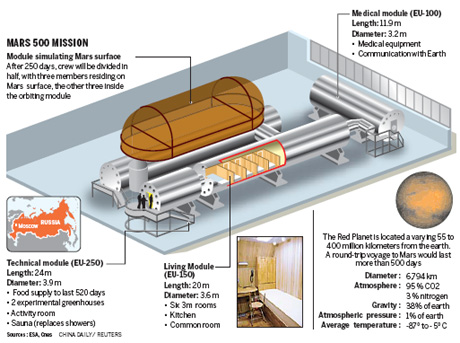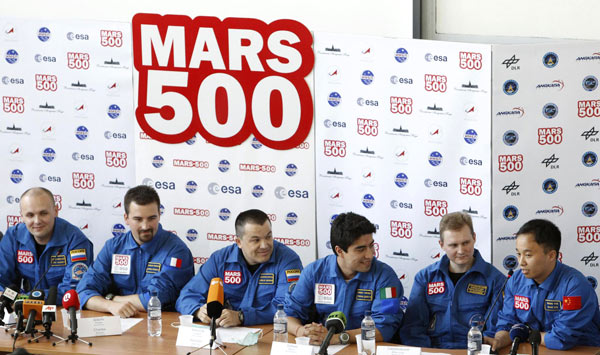Science and Health
Scientists begin 520-day Mars mission simulation
(Agencies)
Updated: 2010-06-04 06:51
 |
Large Medium Small |
|
|
MOSCOW - An international team of researchers climbed into a set of windowless steel capsules Thursday to launch a 520-day simulation of a flight to Mars intended to help real space crews of the future cope with confinement, stress and fatigue of interplanetary travel.
The six-member, all-male crew of three Russians, a Frenchman, an Italian-Colombian and a Chinese will follow a tight regimen of experiments and exercise under video surveillance.
|
||||
"For me, it will be mainly my family, and the sun and fresh air," French participant Romain Charles said when asked by reporters what he will miss most during the 520-day confinement.
The researchers will communicate with the outside world via the Internet - delayed and occasionally disrupted to imitate the effects of space travel. They will eat canned food similar to that currently offered on the International Space Station and shower only once a week or so. Crew members will have two days off a week, except when emergencies are simulated, though they will still be in the capsules.
"Certainly, the crew is largely on its own here, with very limited communications with the outside world," Martin Zell of the ESA's Directorate of Human Spaceflight said. "They have to cope internally with a lot of conditions and to organize themselves."

A real mission to Mars is decades away because of huge costs and massive technological challenges, particularly the task of creating a compact shield that will protect the crew from deadly space radiation. US President Barack Obama said last month that he foresaw sending astronauts to orbit Mars by the mid-2030s.
The crew members said they were confident of success. Diego Urbina, the Italian-Colombian member, told a news conference that for him it would mean "accomplishing dreams about the future, doing something that no human has done before."
Psychologists said long confinement would put the team under stress as they grow increasingly tired of each other's company. Psychological conditions can be even more challenging on a mock mission than a real flight because the crew won't experience any of the euphoria or dangers of actual space travel.
French participant Romain Charles said he was bringing along a guitar to warm the atmosphere. Others said they would bring books, movies and pictures of their relatives.
The crew will split their days into eight hours of work, eight hours of sleep and eight hours of leisure.
"The routine is much more than on a real mission, there is a little bit less thrill," Zell said. "But I think their team spirit, and their motivation to go there and to accomplish the whole mission is enormous."
As part of efforts to keep the crew in good spirits, they will play an "interplanetary" match with former world chess champion Anatoly Karpov at some point during the experiment.



